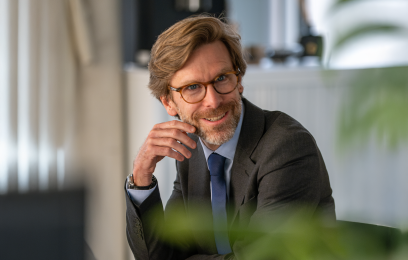CIVICA – The European University of Social Sciences is one of the sixteen European university alliances to receive continued support from the 2022-2027 Erasmus+ programme, as the European Commission announced this week.
After a three-year pilot phase, this achievement sets the stage to establish CIVICA as an integrated deep and fully-fledged European university alliance in the social sciences, now bringing together ten world-renowned higher education institutions across Europe. During this new phase, CIVICA aims to develop a joint vision for 2030 with respect to priorities on education, research, innovation and service to society.
With a total budget of 272 million euros, the European Commission launched the 2022 Erasmus+ European Universities call to facilitate the full roll-out of the European Universities initiative. The CIVICA alliance outlined an ambitious set of actions for the future in a strategic proposal submitted last March. The new Erasmus+ programme will provide each selected alliance with up to 14.4 million euros to foster the institutional transformation of the European Higher Education and Research Area.
“We are all thrilled to hear about this positive outcome as the European Commission has decided to continue supporting CIVICA’s development” said Mathias Vicherat, President of Sciences Po and CIVICA Coordinator. “The renewed Erasmus+ support will accelerate CIVICA’s ambition to assume civic responsibility for current and future European generations, to strengthen the role of Europe in the world, and raise the profile of European social sciences in education and research.”
A coherent and diverse expanded alliance
CIVICA will foster transnational cooperation of world-renowned universities working together for the benefit of students, teachers, researchers and society, as it welcomes two new full partners. IE University (Spain) and the SGH Warsaw School of Economics (Poland) will formally join the alliance in October 2022 as the new phase begins.
“The CIVICA alliance fully supports the policy objectives set for the roll-out phase for the initiative in bringing new partners from across Europe while maintaining a clear and strong coherence among the members around a shared vision and common values” said Kate Vivian, alliance coordinator and Acting Vice-President of International Affairs at Sciences Po.
“In the first pilot years of CIVICA, our alliance has proved exceptionally resilient and able to successfully develop innovative programmes in education and research despite an extraordinary set of circumstances” Vivian stressed. “Based on the first activities implemented and the impactful results achieved, the alliance has confirmed its high potential and is eager to further strengthen its ambitions with the addition of two new partners.”
The expanded alliance will connect more than 72,000 undergraduate and graduate students to a community of 13,000 faculty members and about 7,000 administrative staff from all over the world. “We strongly believe in the fruitful and mutually beneficial cooperation that this project will bring. Grateful to the European Commission for the trust and the support received, SGH Warsaw School of Economics is looking ahead to developing the European University of the future alongside its CIVICA partners” reported SGH Rector, prof. Piotr Wachowiak. “In the past 115 years we have been shaping leaders for the future, and we are certain that SGH’s involvement in the activity of CIVICA will contribute to this mission better than anything else”, he added. For Manuel Muñiz, Provost of IE University and Dean of IE School of Global and Public Affairs “CIVICA will enhance the work that our ten institutions are doing individually on different fronts, enabling us to fulfil our mission in a more impactful way. IE University is thrilled to join the CIVICA alliance. We very much look forward to working with our colleagues on the advancement of European higher education and, above all, addressing together some of the major challenges of our time.”
Building the European University of Social Sciences
CIVICA‘s primary goal is to imbue meaning into its vision of shaping the European University of the future by 2030. To achieve the goal, the partner institutions are committed to consolidate and further expand the alliance with a physical and digital inter-university campus that links teaching and learning, research and innovation, and civil society.
“As one of the founding members of the alliance, we are proud to be part of CIVICA and to contribute to its continued success“ affirmed the new President of the Hertie School in Berlin, Cornelia Woll. “The role of universities is key to navigate the enormous processes of social, economic, and technological change occurring in our society. If we are to discuss and find solutions to the most pressing policy and social issues, we must lock arms across borders and work together on research, teaching, and outreach activities.”
By echoing European policy priorities for the future of higher education, the alliance will continue to establish deeper and sustainable forms of transnational institutional cooperation among its members. Beyond facilitating lifelong learning and the exchange of talent, the ten members aim to develop a diverse and inclusive CIVICA community, while extending the alliance’s global outreach to establish itself as a leading actor in the social sciences.
With the new activities starting in autumn 2022, members of the alliance will give thousands of students and (post)doctoral researchers the chance to benefit from enhanced mobility, new and expanded joint educational offers, and Europe-wide opportunities for civic engagement and extracurricular activities. By autumn 2026, the alliance aims to increase student mobility by 25%, while providing more than 2,000 educational offerings for bachelor and master's students and more than 400 activities for early career researchers over the duration of the project.
Aurélien Krejbich, Executive Director of CIVICA, shares the enthusiasm of all alliance members in embarking onto this new phase: “We are looking forward to kicking off the second round of our ambitious project. This new phase will see the anchoring of the alliance at the institutional level with one priority: make CIVICA a reality for the highest possible number of students, researchers and faculty. We believe that this new chapter will be pivotal in the building of the European University of Social Sciences. We congratulate our fellow alliances who received a positive outcome from the European Commission and we look forward to working together to bring higher education in Europe to the next level.”
In line with a recent CIVICA’s statement, the future work package includes actions to support scholars and students who are at risk due to the war in Ukraine. “In such difficult times, we have to strengthen our cooperation and highlight how all our partners work together as an open academic community who actively contributes to long-lasting peaceful solutions” added Krejbich “CIVICA offers a source of stability and an environment in which the values of autonomy and academic freedom can be defended, particularly in the face of evolving and often challenging European political contexts”.
END
For more information, please contact:
Alessia Manco
CIVICA, Communications Manager
a.manco(at)hertie-school.org
Press contacts
Bocconi University: Tomaso Eridani: tomaso.eridani(at)unibocconi.it / +39-335-6352819
Central European University: Ildiko Rull: rulli(at)ceu.edu
European University Institute: Jessica Carter: jessica.carter(at)eui.eu / +39 377 3905 933
Hertie School: Alina Zurmühlen: pressoffice@hertie-school.org / +49 160 911 669 83
IE University: Rosa Aranda Barrio: Rosa.Aranda(at)ie.edu
National University of Political Studies and Public Administration: Cătălin Mosoia catalin.mosoia(at)snspa.ro / +40723540213 | Anca Goga: anca.goga(at)snspa.ro / +40726.317.063
Sciences Po: Romain Becker: media(at)sciencespo.fr / +33 (0)1 45 49 50 79
SGH Warsaw School of Economics: Maria Karaś: mkaras1(at)sgh.waw.pl | Mariusz Sielski: rzecznik(at)sgh.waw.pl / +48(22)2649947
Stockholm School of Economics: Hanna Flodmark: ylva.mossing(at)hhs.se/+46 730 97 26 16
London School of Economics and Political Science: Associated partner: Danny O’Connor: oconnord(at)lse.ac.uk / +44 (0)207 955 7417
Notes to the editors:
CIVICA brings together ten leading European higher education institutions in the social sciences, humanities, business management and public policy, with a total of 72,000 students and 13,000 faculty members. Together, they build on an ever-stronger combination of teaching, research and innovation to mobilise and share knowledge as a public good and to facilitate civic responsibility in Europe and beyond.
CIVICA’s members are: Bocconi University (Italy), Central European University (Austria), European University Institute (Intergovernmental), Hertie School (Germany), IE University (Spain), National University of Political Studies and Public Administration (Romania), Sciences Po (France), SGH Warsaw School of Economics (Poland), Stockholm School of Economics (Sweden) and The London School of Economics and Political Sciences (United Kingdom).
• www.civica.eu and @CIVICA_EU
• www.unibocconi.eu
• www.ceu.edu
• www.eui.eu
• www.hertie-school.org
• www.ie.edu
• www.snspa.ro
• www.sciencespo.fr
• www.sgh.waw.pl
• www.hhs.se
• www.lse.ac.uk

18.06.2025
CONFLICTS: AN INTERDISCIPLINARY ANALYSIS LED BY HUGO MICHERON IN SCIENCES PO’S JOURNAL COMPRENDRE SON TEMPS
Paris, 18 June 2025 – The third issue of Comprendre son temps, the journal published by Sciences Po, offers an in-depth analysis of contemporary conflicts amidst heightened geopolitical tensions.
Political scientist Hugo Micheron, who specialises in the Middle East and jihadism, coordinated the contributions of ten researchers who aimed to explore the new forms of conflict that have recently emerged: the militarisation of digital space, the weaponisation of information, the reconfiguration of alliances and power dynamics, the hybridisation of threats, and the return of high-intensity warfare — from Ukraine to Gaza. These contributions examine the systemic transformations redefining the attributes of power and critically assess Europe’s evolving role in the global order.
Contributors to this issue include Thierry Balzacq, Professor and researcher at the Centre for International Studies (CERI); Christophe Jaffrelot, CNRS Research Director at CERI; and Frédéric Ramel, Professor and researcher at CERI. Regular contributors to Sciences Po have also participated, such as writer and lecturer Giuliano Da Empoli; Asma Mhalla, political scientist and lecturer; and author Karine Tuil.
Hugo Micheron, scientific director of the issue : “The current period is marked by profound geopolitical transformations that challenge Europe’s place and role on the world stage, as well as its ability to assert itself as a leading geopolitical actor. It is essential for a group of influential EU countries to align their diplomatic orientations in order to rethink conflict in all its strategic dimensions. This is the collective analysis put forward by Sciences Po researchers in this issue."
Luis Vassy, Director of Sciences Po : "In an era where conflict is no longer an exception but a structural reality, it is vital to place this notion at the heart of both our scientific inquiry and educational mission."
About Comprendre son temps
Comprendre son temps is Sciences Po’s journal in the humanities and social sciences, offering insights into the major ruptures shaping today’s world and supporting both public and private decision-making. Published biannually, it seeks to make the institution’s high-quality academic research accessible to the widest possible audience by addressing a major social and political issue.
About Hugo Micheron
Hugo Micheron is a political scientist, fluent in Arabic and specialising in the Middle East and jihadism. He is a Senior Fellow at the Program on Extremism at George Washington University and teaches at Sciences Po, where he leads the seminar Artificial Intelligence, Democracy, and the Information Environment. He is the author of La Colère et l’Oubli. Les démocraties face au jihadisme européen (Gallimard, 2023), awarded both the Femina Essay Prize and the Brienne Prize for Geopolitical Literature in 2023.
Read more


